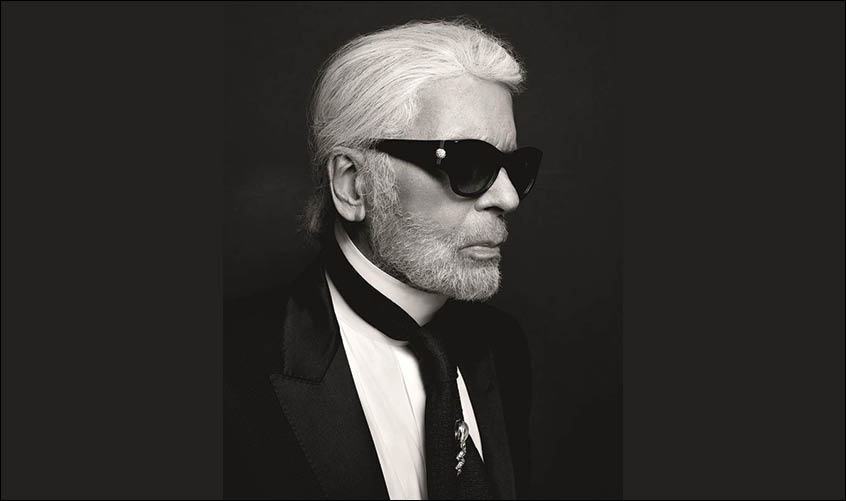Karl Lagerfeld, one of the most celebrated and influential fashion designers of our age, died on 19 February. He served as the creative director of the luxury French fashion house Chanel since 1983, and was also the creative force behind Fendi, the Italian premium fur and apparel brand which he joined in 1965.
Speculations about his declining health started doing the rounds after he missed Chanel’s haute couture show in Paris last month. He was 85 years old.
Lagerfeld was nothing short of a legend in the fashion industry. He is credited for reinventing haute couture as well as for introducing a range of ready-to-wear collections. His vision defied the set standards of high-street fashion and inspired young designers around the world to take the same approach.
Born in Hamburg, Germany, Lagerfeld moved to Paris as a teenager. It is largely due to his work that Paris is today recognised as the fashion capital of the world. Recounting his initial years in the business, Lagerfeld once said that his big break came a year after he won a fashion competition in the “coat category” in 1954. Then he was hired as an assistant at Pierre Balmain’s couture house.
In the following decade, he worked with various fashion houses as a freelancer before finding his footing with Fendi. This was a time when ready-to-wear creations were on the rise and Lagerfeld could sense that. The trend soon came to be associated with his name.
Lagerfeld, who also worked with the French brand Chloé, was known for his parallel tie-ups with multiple fashion houses. He not only retained his position at several labels simultaneously, but through his many associations helped shape the landscape of modern fashion.
But his most significant work was with Chanel. Assuming the reins of the luxury label a decade after its founder died, Lagerfeld had set himself the difficult task of reviving a brand whose reputation was going downhill. His solution was to change Chanel’s image by making its designs less iconic and more contemporary. Under his guidance, Chanel became a fashion phenomenon and a worldwide success.
To the criticism he received for letting the original designs of the brand fade in his constant pursuit of updating products, he gave a statement in 2011, saying, “I had to find my mark. I had to go from what Chanel was to what it should be, could be, what it had been, to something else.”
Lagerfeld also established his eponymous brand in 1984. At the launch of his label, Karl Lagerfeld, he said, “I would like to be a one-man multinational fashion phenomenon.” And even though the Lagerfeld line did not find the same glory as the other labels he worked for, it certainly helped him spruce up his fashion CV and add a new dimension to his career.
Today, everyone in the fashion world is mourning his loss. Chanel’s chief executive, Alain Wertheimer, released a statement shortly after his death, saying, “Karl Lagerfeld was ahead of his time, which widely contributed to the House of Chanel’s success throughout the world.” Vogue’s editor-in-chief, Anna Wintour also gave a statement: “Today the world lost a giant among men.” She went on to call Lagerfeld’s “creative genius” as “breathtaking”.
Bernard Arnault, chairman and chief executive of LVMH, which owns Fendi, said, “We owe him a great deal: his taste and talent were the most exceptional I have ever known. I will always remember his immense imagination, his ability to conceive new trends for every season, his inexhaustible energy, the virtuosity of his drawings, his carefully guarded independence, his encyclopedic culture and his unique wit and eloquence.” The House of Karl Lagerfeld also commemorated the late designer, saying, “He leaves behind an extraordinary legacy as one of the greatest designers of our time.”
Over the years, Lagerfeld developed an unmissable signature style as a designer. What earned him the reputation of being one of the most recognisable figures in the world, were his dark glasses, high starched collars, fingerless gloves and trademark white ponytail.
In addition to being a fashion designer, he was also a photographer and caricaturist, and authored The Karl Lagerfeld Diet in 2002, a book about his lifestyle changes and experience of losing 92 pounds. In 2008, a documentary was made on his life, called Lagerfeld Confidential.
His controversial comments, like “I’m very much down to earth. Just not this earth”, often made headlines. He once also said, “You want to create boredom? Be politically correct in your conversation.” Some of these flamboyant statements became so famous that they were published in a book, The World According to Karl, in 2013.
But that aside, Lagerfeld will be remembered for his fashion-forward ideas and his lasting contribution to the fashion scene, for which he received many accolades over the course of his distinguished career
Even in his 80s, he continued to work and deliver new and inventive designs. Whenever posed with the question of retirement, he would quip that if he stopped working, he would die and it would all be finished.

